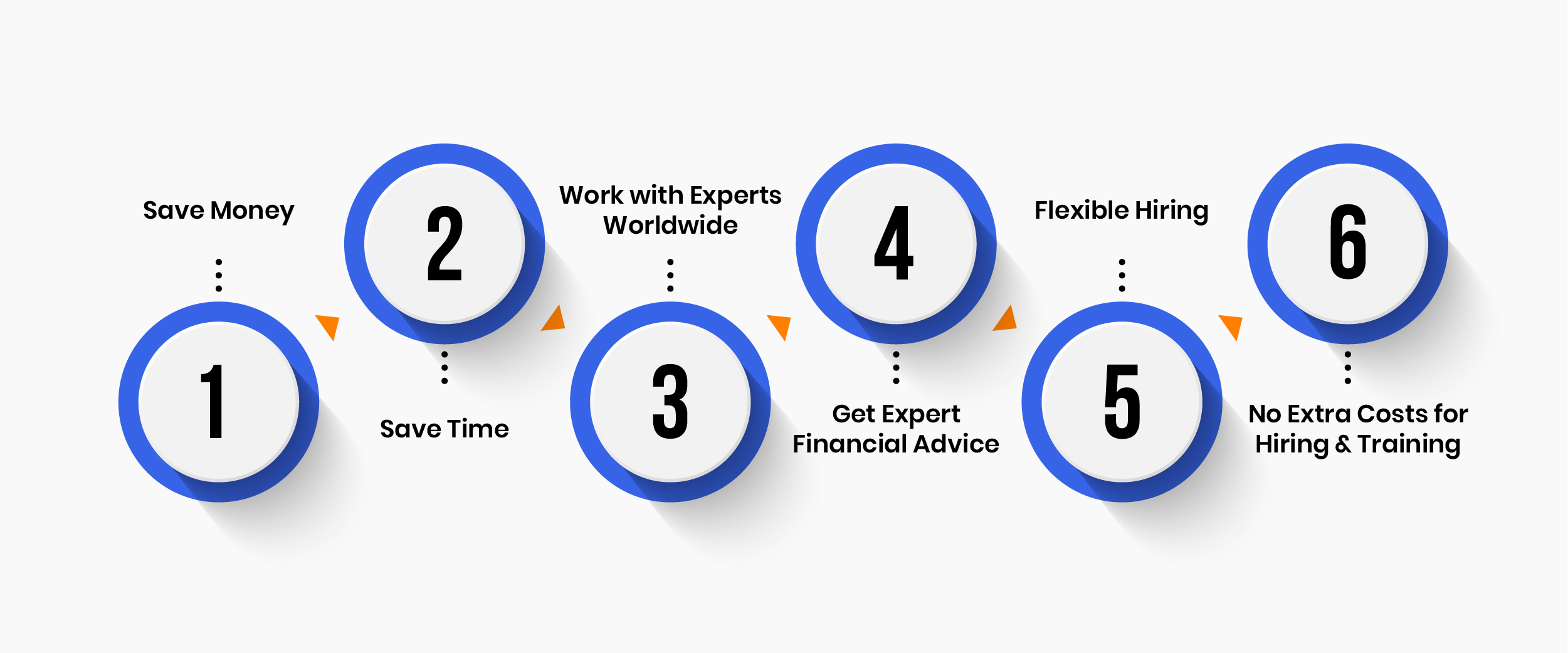E-commerce accounting simplifies finances, reducing stress. Offshoring saves time, ensures accuracy, and promotes growth.
eCommerce sales will reach $8 trillion by 2026 and $10 trillion by 2027. With rising competition, businesses must reduce expenses without sacrificing quality. In 2024, over 3 billion people will shop online, fueling global eCommerce growth. Plus, 52% of small businesses plan to outsource in the future.
Can outsourcing accounting help? Let’s find out.
Understanding eCommerce Accounting
E-commerce accounting handles diverse payments, global sales, inventory shifts, and complex taxes. These factors need specialized accounting solutions to offer smooth financial management. For small business owners, managing these complexities alone can be difficult. eCommerce accountants manage transactions, taxes, and records, freeing owners to grow their business.
Why Outsource eCommerce Accounting?

Outsourcing eCommerce accounting saves money, boosts accuracy, and reduces workload with expert support. Outsource accounting when financial tasks become too complex to handle in-house. Lacking financial expertise? Outsource to experts for tax, bookkeeping, and reporting. Growing businesses can outsource accounting for efficiency without hiring full-time staff.
Outsourcing eCommerce accounting offers many benefits. It cuts costs by removing the need for full-time staff and software. Businesses gain expert support in online transactions, taxes, and inventory. Outsourcing lets companies scale and pay only for what they need. It frees up time for growth, marketing, and customer service.
Save Money
Offshoring is cheaper than employing permanent staff. Skilled foreign accountants offer lower rates due to currency differences. Save money to invest in marketing, products, or growth.
Save Time
Accounting takes a lot of time. Outsource to focus on business while experts manage finances. No more worrying about bookkeeping at the end of a long day!
Work with Experts Worldwide
Outsourcing firms hire experienced professionals who understand e-commerce finances. Pick a company that specializes in eCommerce accounting for the correct results.
Get Expert Financial Advice
Outsourced accounting provides expert aid with budgeting, taxes, and planning. This enables you to make better business decisions and prevent pricey errors.
Flexible Hiring
You don’t need a permanent accountant. Outsourcing lets you hire professionals as needed for projects or ongoing support. Need support setting up an accounting system? Hire an expert for that task, no permanent commitment required.
No Extra Costs for Hiring & Training
Outsourcing saves money on hiring, training, and equipment. The accounting firm provides everything needed to do the job. This lets you focus on growing your business instead of spending on extra resources.
Why E-commerce Bookkeeping is Different
E-commerce bookkeeping involves many payment platforms, tax rules, and high transaction volumes. Manual tracking is difficult, so using the right tools is essential. Bookkeeping tracks top-selling products, budgets, and cash flow. It prevents overspending and helps you adjust strategies for better profits. Accurate records simplify taxes and prevent penalties. If tax authorities request records, bookkeeping saves you from stress. Tools like QuickBooks, Xero, and Wave automate tracking, sync with Shopify, and cut errors. A professional ensures accuracy, tax compliance, and organization, saving you time and money.
What Accounting Tasks Can You Outsource?

Outsourced accounting is becoming a go-to strategy for businesses looking for financial expertise. Companies enjoy these services for their specialized expertise. Customer needs, technology, and regulations shape outsourced accounting’s fate. As automation, AI, and remote work develop, businesses can expect affordable, effective solutions.
Businesses outsource a variety of accounting tasks to enrich efficiency and save time. They outsource bookkeeping to reconcile accounts and record transactions. Tax prep is often outsourced to ensure compliance with changing laws. AP and AR outsourcing enriches cash flow, invoicing, and payment handling. Businesses outsource financial reporting for accurate, timely insights. Businesses outsource payroll to ensure accurate, timely employee payments. Some companies outsource CFO services for strategic financial planning without a full-time hire.
In 2025, AI, new compliance regulations, and increasing demand are reshaping outsourced accounting. One of the greatest changes is the rise of AI and automation. Around 71% of accountants say AI will affect the industry. Automation minimizes work, and AI delivers instant financial insights for smarter decisions.
Cloud accounting tools ensure access, teamwork, and security. Companies strengthen security against cyber threats. Compliance with changing financial regulations is another major factor. Frequent tax law changes make compliance challenging for businesses. Outsourced accounting providers aid firms stay compliant and avoid penalties. Real-time reporting tools provide instant insights for quick, informed decisions.
Global expansion drives demand for outsourced accounting with cross-border expertise. Businesses trust experts for taxes, bookkeeping, and cash flow to drive growth. Sustainability reporting is growing, with 71% of leaders prioritizing ESG. Outsourced accountants ensure compliance.
Accounting software automates invoicing, expenses, and taxes. Track sales, separate finances, and keep records for smooth audits. Plan taxes to avoid surprises.
Industries Using Outsourced Accounting

Businesses in various industries are turning to outsourced accounting for better financial management. Tech and engineering firms rely on these services to support fast growth and global operations. Real estate firms outsource accounting for transactions, tax compliance, and property finances. Manufacturing businesses use outsourced providers to handle cost accounting and inventory control.
Oil and gas firms outsource accounting for cost tracking, compliance, and reporting. Nonprofits need accounting for transparency and grant compliance. eCommerce and retail outsource accounting for inventory, taxes, and payments.
Marketing agencies outsource accounting for finances. Healthcare organizations use these services for billing, financial compliance, and payroll. Legal and consulting firms outsource accounting for billing, time tracking, and revenue recognition. Even accounting firms outsource bookkeeping, payroll, and taxes to focus on advisory services.
Common eCommerce Challenges
- Running an eCommerce business comes with financial challenges.
- Managing inventory, multi-currency transactions, and global tax compliance can be difficult.
- Promotions, discounts, and refunds further complicate financial tracking.
- Outsourcing keeps finances organized and records accurate.
Conclusion
Offshoring eCommerce accounting is an affordable solution that enriches accuracy and financial management. Proper financial management is vital for success. Offshoring aids you save time, reduce costs, and get expert insights. Professionals manage accounting, so owners concentrate on growth, sales, and customers. Smart financial decisions with experts help drive long-term eCommerce success.
Want to grow your eCommerce business while staying financially strong? Outsourcing could be the solution!

